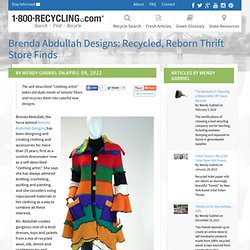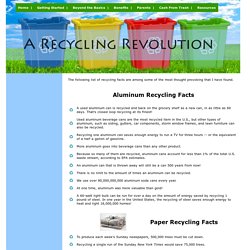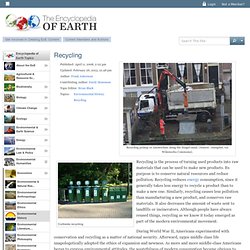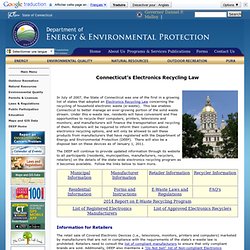

Recycling Of E-waste In China May Expose Mothers, Infants To High Dioxin Levels. Brenda Abdullah Designs: Recycled, Reborn Thrift Store Finds. Brenda Abdullah, the force behind Brenda Abdullah Designs, has been designing and creating clothing and accessories for more than 25 years, first as a custom dressmaker now as a self-described "clothing artist.

" She says she has always admired knitting, crocheting, quilting and painting, and she considers using repurposed materials in her clothing as a way to combine all these interests. Ms. A New Recycling Strategy Is Catching On. Creative Recycling - Electronics & Computer Recycling. DEP: Recycling in Connecticut. Dell launches free e-waste recycling program covering all Dell computers. Recycling Facts - A Recycling Revolution. The following list of recycling facts are among some of the most thought provoking that I have found.

These recycling facts have been compiled from various sources including the National Recycling Coalition, the Environmental Protection Agency, and Earth911.org. While I make every effort to provide accurate information, I make no warranty or guarantee that the facts presented here are exact. We welcome all polite corrections to our information. Please also feel free to contact us if you have additional recycling facts to share. Links to our web site are always welcome. Fashion Coterie Proves That Eco-Fashion is Far from Frumpy. The twice-annual fashion tradeshow debuted some green duds that fashionistas can get behind.
New York City’s Fashion Coterie tradeshow happens twice annually — a gathering where retailers can see designers’ newest product lines and purchase their inventory for upcoming seasons. All of the popular lines that we know of and see around in our local boutiques are there, such as UGG Australia, Trina Turk, Tibi, Shoshanna, Steve Madden, BCBG and Citizens of Humanity. But, over the years, we’ve seen a growing trend of eco-friendly designers as well, and like to seek them out first to see what’s new and inspiring. Let’s get one thing straight: Eco-fashion does not equal frumpy. In fact, we were quite impressed by many of the brands that were showing at Coterie’s latest show in February 2012. We were hooked on Collared Greens as soon as we were introduced. Collared Greens' Dogwood Bow in yellow.
All of the products from Collared Greens are made in the U.S. Food Recycling on the Rise in Japan. Aqua Takes Chicago to Greener Heights. While we see many homes being built that incorporate sustainable practices, it’s not often that you can find them in the heart of a city. We imagine that it is even more challenging to build green high rises, which are the majority of the buildings in many city cores. So, when we came across Aqua, a LEED-qualified 81-story mixed-use condo complex in Chicago, we were very impressed and wanted to know more. Located in downtown Chicago off of Lakeshore Drive and within a quarter-mile from several public transportation options, Aqua’s condo units begin on the 53rd floor of the building (floors one to 52 include parkhomes, the Aqua Shore Club, gardens, a Radisson Hotel and rental units) and range from studios to three-bedroom residences. Boasting sweeping views courtesy of floor-to-ceiling windows, Aqua is a new addition to the Chicago skyline.
We’ll start with the sustainable outdoor features, since one of Aqua’s primary goals is to provide residents with access to the outdoors. How long does it take for plastics to biodegrade?" Drop a ketchup bottle on the floor, and you'll be thankful for polyethylene terephthalate, or PET, the nearly indestructible plastic used to make most containers and bottles. Drop the same bottle into a landfill, however, and you might have second thoughts. Why? Because petroleum-based plastics like PET don't decompose the same way organic material does. Wood, grass and food scraps undergo a process known as biodegradation when they're buried, which is a fancy way of saying they're transformed by bacteria in the soil into other useful compounds. But bacteria turn up their noses at plastic. Based on this logic, it's safe to argue that plastic will never biodegrade. Until other researchers can replicate Burd's experiment and waste treatment plants can implement any new processes, the only real way to break down plastic is through photodegradation.
Of course, plastic buried in a landfill rarely sees the light of day. One solution to this environmental disaster is biodegradable plastic. Recycling. Curbside recycling.

Recycling is the process of turning used products into raw materials that can be used to make new products. Its purpose is to conserve natural resources and reduce pollution. Recycling reduces energy consumption, since it generally takes less energy to recycle a product than to make a new one. Similarly, recycling causes less pollution than manufacturing a new product, and conserves raw materials. It also decreases the amount of waste sent to landfills or incinerators. Recycling World Forum: States Should Lead the Way Toward Recycling - Environmental Defense Fund. Recycling not always an energy and resource saver, study finds.
(NaturalNews) A recent study conducted by researchers from the Massachusetts Institute of Technology (MIT) has found that remanufacturing or recycling certain products actually uses more energy than simply using new products. Published in the journal Environmental Science & Technology, the findings cast doubt on the notion that remanufacturing things like old tires and used motor cores always helps to save energy and resources in the long run. Timothy Gutowski, professor of Mechanical Engineering at MIT, and his colleagues conducted 25 case studies on products in eight different categories and found that for every remanufactured product that appeared to have a net energy savings, there was another that had a net energy loss. And even among those with net savings, the benefits were often minute or even negligible. How to Recycle « Recycling Guide. Recycling is an important factor in conserving natural resources and greatly contributes towards improving the environment.
Below are some helpful hints about recycling in and around the home. Household Recycling Recycling in and around the home can be easy when you know how. By thinking carefully about what products you buy at the supermarket and how to recycle them is the first step towards efficient recycling. DEP: CT Electronic Recycling Law. Connecticut’s Electronics Recycling Law In July of 2007, the State of Connecticut was one of the first in a growing list of states that adopted an Electronics Recycling Law concerning the recycling of household electronic waste (e-waste).

This law enables Connecticut to better manage an ever-growing portion of the solid waste stream. Recycling not always an energy and resource saver, study finds. Recycling.